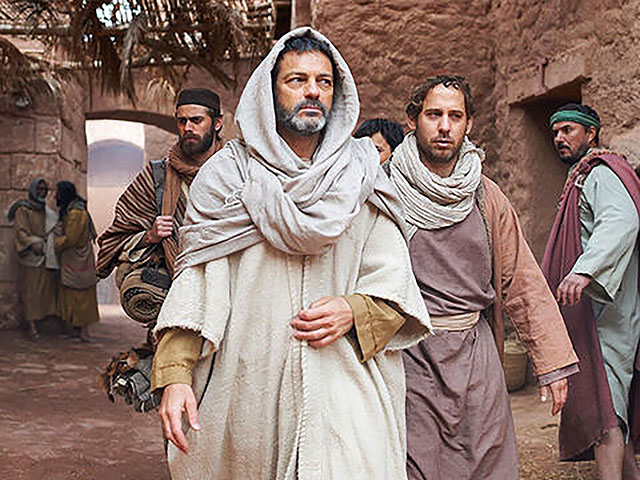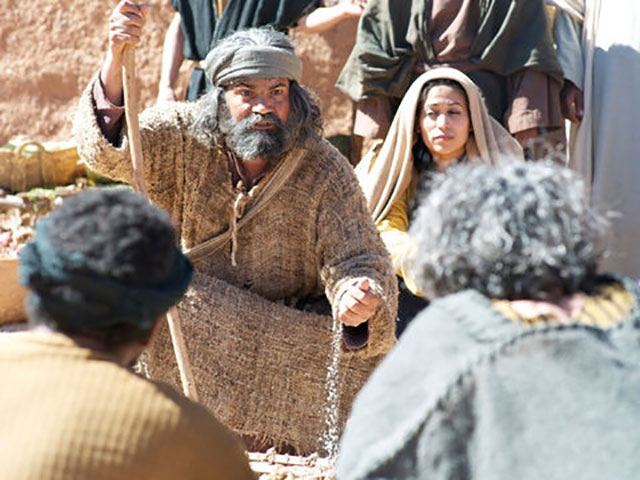
Good morning my “Walking with Jesus” friends,
I wonder if you’ve ever had the privilege of being part of a delegation sent out to bring a specific message to a group of people who were anxiously awaiting the message? This weekend I left you in Jerusalem, in the year 48ad, after a historic, landmark decision had been reached in what many call the “Jerusalem Council”. If you’ve been with us you recall Barnabas and Paul had come to Jerusalem from Syrian Antioch traveling with a few Gentile Christians. They met in Jerusalem with Peter, James, John and the other apostles, and several of the elders of the Jewish Jesus movement there.
The issue at hand was the need for a clear answer to a fundamental question: What must a person do for God to forgive their sin? The past few days we’ve looked closely at the debate and their conclusion, and why it was so important for them in the first century, and for all people since.
We’ve been comparing Dr. Luke’s account of these historic events as recorded in Acts 15 with Paul’s description of the events as he wrote some time later to the Galatian Gentile Christians as recorded in Galatians 2. Let’s rejoin the story as Dr Luke tells us what happened after the historic decision was reached in the “Jerusalem Council”. Acts 15:22 says: “Then the apostles and elders, with the whole Jerusalem church, decided to choose some of their own men and send them to Syrian Antioch along with Paul and Barnabas. They chose Judas (called Barsabbas) and Silas, two men who were leaders among the Jerusalem Jesus followers.”
Luke also tells us a letter was written by the apostles and sent via Barsabbas and Silas, to be delivered to the Gentile Christians in Antioch by this delegation. Can you see the delegation preparing to leave Jerusalem for the nearly 400 mile trip north to Syrian Antioch? Perhaps Judas Barsabbas and Silas had never been up north before, and they likely had so many questions, for Antioch would be far, far different from the Jerusalem they knew so well, with the great Jewish temple and most of the people in Jerusalem being Jewish. I can imagine Paul and Barnabas were talking almost non-stop as they walked, telling them about the many different ethnic groups, cultures and even religions they would encounter in predominantly Gentile Antioch.
Luke’s record continues: “The men were sent off and went to Syrian Antioch, where they gathered the church together and delivered the letter. The people read it and were glad for its encouraging message. Judas (Barsabbas) and Silas… said much to encourage and strengthen the brothers in Antioch. After spending some time in Antioch, they were sent off by the Gentile Christians with the blessing of peace, to return to Jerusalem and to those who had sent them. But Paul and Barnabas remained in Antioch, where they and many others taught and preached the word of the Lord.” (Acts 15:30-35) We’ve each probably had the experience of visiting a new town or city and our friends who lived there welcomed us and showed us around and introduced us to their friends. That’s exactly what was happening here in Syrian Antioch!

As they had arrived you can imagine, I’m sure, that Silas and Judas (Barsabbas) felt like strangers, hearing languages they’d never heard before and seeing things they’d never seen before! Very soon after entering the city gate I imagine Paul and Barnabas saw people they knew and began the introductions. As soon as they told their Antioch Gentile Christian friends that their traveling companions could be trusted and were Jewish Christians, I’m sure big smiles spread across their faces and welcoming embraces happened.
My friends, I’m sure you’ve had the experience, perhaps many times, of meeting people for the very first time and discovering that they, like you, are Christians. They love the Bible as you do. They love the Gospel as you do. They love gathering with their friends to worship God and they pray in Jesus’ name, as you do! Do you remember the feeling of family that you suddenly had with these new friends, even though you may not have known much more about them than their name and that they too claim to be Christians? That my friends, is the miracle of the global family of God, the global church of Jesus Christ, the people of God.
Oh how those gatherings in Syrian Antioch must have become great celebrations as the Antioch Gentile Christians came to understand that they were fully embraced as brothers and sisters in Christ, fully equal in the family of God with the Jerusalem Jewish Christians!
It seems Silas and Judas (Barsabbas) stayed in Antioch for some time, enjoying their new friendships and this remarkable city, but soon the day came they realized their mission was complete and they prepared to return to Jerusalem. Did you notice they didn’t just walk out of town? The Gentile Christians had a special farewell for them, sending them back to Jerusalem with their thanks and their blessing! Perhaps Paul and Barnabas walked them out of Antioch to the bend in the road and there, with the Antioch skyline behind them, prayed with them, gave them one final embrace, and sent them off down the road to Jerusalem. Then Paul and Barnabas returned to Antioch, to continue teaching these Gentile Christians.
I don’t know how much time passed, but as Paul spreads out his parchments to continue writing his letter to the Gentile Christians in Galatia, Paul tells us about a famous visitor to Antioch and how that visit, while significant, was not as happy an occasion as it had been with Silas and Judas (Barsabbas). Paul writes in Galatians 2:11 “When Peter came to Antioch, I, Paul, opposed him to his face, because he was clearly in the wrong. Before certain men came from James, Peter used to eat with the Gentiles. But when they arrived, Peter began to draw back and separate himself from the Gentiles because he was afraid of those who belong to the circumcision group. The other Jews joined him in his hypocrisy, so that even Barnabas was led astray.” Oh my, that is so painful to hear isn’t it?
Have you ever found yourself in a situation where you feel the pressure to compromise even some very strong personal values or beliefs in order to accomodate or please some people who hold strongly to opinions or values which are different from yours? We all want to be liked and affirmed by people. None of us enjoy conflict. But one of the things which angered Paul, perhaps more than anything else, was hypocrisy in a Christian or a Christian who compromised their strongly held spiritual values to receive affirmation from people who disagreed with them.
Evidently Peter had come to Syrian Antioch to visit Paul and Barnabas and see first hand what the Holy Spirit was accomplishing there among the Gentile Christians. The apostle Peter was well received as an honored guest, after all Peter had been a close friend of Jesus! Peter had stories about Jesus he could tell which Paul did not know, for Paul had not been among those 12 original disciples with Jesus.
Can you imagine how many times Peter heard, ‘please Peter, tell us another Jesus story’!? And Peter would smile, lean his head back, look far away as though he was replaying in his memory the hundreds of wonderful experiences he’d had with Jesus, and then came that sparkle in Peter’s eye, perhaps he rubbed his hands together in excitement as he leaned forward to speak, another breathtaking story of the miracles of Jesus which Peter had been eyewitness to! Oh those must have been wonderful days with Peter telling the stories of Jesus only Peter could tell, and Paul teaching the deep doctrinal truths of Jesus’ redemption accomplishments which Paul had uniquely learned from the Holy Spirit.

But then evidently another delegation of Jewish Christians came from Jerusalem to Syrian Antioch, claiming some fresh insight from James and the apostles. We have no record of exactly what they said or who they were, but evidently Peter began to pull back from his close association with the Gentile Christians and it shocked and angered Paul. We’ll look more closely at this tomorrow and exactly what happened, but for today may I ask us a few important questions?
1. Do you have any non-negotiables? Values or convictions which are so strong you simply will not compromise no matter what pressure or even persecution you might endure?
What are those non-negotiables and why are they so important to you? If you are married, does your spouse understand these non-negotiables? If you have a family do your children and grandchildren understand why these convictions you hold are simply non-negotiable?
2. If you do have some non-negotiables in your life, upon what are they built? Family traditions, religious beliefs, some portions of the Bible, some encounters you’ve had with God?
3. If you don’t have any non-negotiables, if everything in your life, every belief, every value, is willing to be compromised, what does that mean for you?
I urge us to spend some time talking with God about these important questions, and tomorrow we’ll come right back here to see what happened with Paul and Peter. And here’s a song to help you ponder these things, friends.
Bible images provided with attribution to www.LumoProject.com.
Have a comment or question about today’s chapter? I’m ready to hear from you, contact me here.

Pastor Doug Anderson 262.441.8785
“Let us run with perseverance the race marked out for us, with our eyes fixed on Jesus…” (Heb. 12:1,2)
Archived back issues of “Walking with Jesus” and other resources are available by clicking here to open our ‘home page’ (or go to HOME at upper right of this page).
Share with friends. Subscribe below for daily “Walking with Jesus”.


